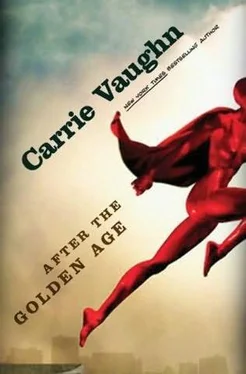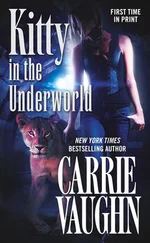Suzanne kept her arm around her. “Come on, let’s go get some lunch.”
Robbie tousled her hair like he’d been doing since she was a kid. For a long stretch of time during her teenage years, it had annoyed her into screaming fits, which made Robbie tease her more. But now she laughed.
Arthur Mentis offered his hand. She shook it calmly.
He said, “I always knew you’d turn out all right.”
Which nearly made her cry.
* * *
When she emerged back into the asylum lobby, the orderly was talking on the phone. He glanced at her, his gaze dark and suspicious.
“Never mind, she’s back,” he said, and hung up.
Celia didn’t wait around for explanations, either his or hers. She flashed him a smile and strolled back into the street.
Michael, bless him, was still waiting with the car. She piled into the front seat.
“Now you’re going to say you don’t want me telling your parents you were here,” he said, starting the engine and preparing to pull into traffic.
“That would just worry them, don’t you think?”
“Just tell me you know what you’re doing.”
She hesitated, which made him glare at her.
“Sure,” she said. What the hell? “I know what I’m doing.”
“I suppose you’re at least making your own trouble now instead of getting wrapped up in somebody else’s.” That was a kind observation. “We’re going back to the Plaza now, right?”
“Yes. Thank you, Michael.”
THE penthouse was still deserted. “Mom? Dad?” she called out. No answer. They’d been gone all day. The gauze bandage covering her stitches itched, and she felt a raw, gnawing anxiety.
She went to the Olympiad command room. There, she found Robbie—the Bullet, actually, in uniform sans mask—at the communications station, listening to police radio.
“Hey! I thought you’d be in bed asleep,” he said.
“I had work to do.” He gave her a reprimanding glance. If he offered her hot cocoa, so help her God— “Where is everyone?”
“Your dad’s at the courthouse. The jury’s taking forever, which has the good Captain worried. Spark’s trying to meet with the police chief about coordinating some kind of patrol for the city tonight, but I don’t think she’s having any luck.”
“How’s it look out there?”
He shook his head. “It’s like the whole city’s holding its breath. Something’s going to happen but no one knows what. Only thing on the radio is car accidents—people are twitchy, rear-ending each other. I can’t find the independent supers; they’ve all gone to ground, I think. Waiting.”
“Has Dr. Mentis been back?”
Robbie shook his head. “Haven’t seen him all day. Why?”
“He—” She shook her head. She was worried. She needed to see him. Robbie didn’t need to know all that.
“I’d love to know what he found out about Mayor Paulson.”
She just bet he would. Arthur ought to be here, and her stomach flipped a little. The Olympiad was in action, and he’d disappeared.
“Have you called his office?” she said.
“If he’s there, he’s not answering.”
“That’s not like him.”
“Hey, if he’s in trouble, he’ll find a way to let us know.”
He’d speak to their minds across the distance. For his closest friends, space wasn’t a barrier for the connection.
Would there come a time when he refused to ask for help?
“I’ll see you later,” she said, turning to leave.
“You’re not going out, are you? I don’t think your folks—”
“I won’t leave the building, I promise.”
“Celia, you’re still hurt. You look like you’re about to pass out.”
“I’m fine. I’ve got my cell phone. I’ll call you if I need help, I promise.”
She left before he could say anything else.
* * *
She rode the elevator down to the eighteenth floor.
In the heart of the building, the office spaces were efficient and elegant. Gray berber carpeting led down hallways with recessed lighting. Silk plants in brass stands decorated corners. The Plaza hired staff just to keep those plants dusted. Accounting firms, law firms, investment firms, insurance companies—all had offices here, marked by frosted glass fronts with their names painted in neat black letters. Originally, Celia’s chief interest in working for Smith and Kurchanski had been that their offices weren’t located in West Plaza.
Dr. Arthur Mentis’s office was marked only by a brass nameplate on a wood-stained door at the end of a hallway. Not a prime location, but he didn’t need much space. He wanted to work here so he’d be close to the Olympiad’s headquarters. And Warren gave him the place rent-free.
She knocked.
“Arthur? Are you here? Can I come in?” She knocked again. And again. If something had happened to him, she’d have felt it. She knew she would have.
In much the same way, something told her that he had to be here.
“It’s Celia. Will you let me in? Arthur!”
At that, the door opened. He might have been waiting just on the other side, debating about whether or not to open it.
She could see why there might be a debate. He looked awful. Face frowning, hair ruffled, he wore his shirt unbuttoned, baring the undershirt. He leaned on the open door and the frame, holding a bottle of scotch. He didn’t smell of alcohol; he only looked drunk. The bottle was full and unopened. He was showing some kind of emotion—which one, she couldn’t guess.
“You shouldn’t be here,” he said.
“I was worried about you.”
“You shouldn’t worry about me.”
“Can I come in?”
He stepped aside and swung the door open. When he wandered away, she closed it.
His office suite had two rooms. The front was a calculated, elegant public face, with a soft leather sofa, antique desk, bookshelves, and inoffensive Impressionist artwork on the walls. The back door of this room was open, leading to an inner office. Curious, she walked back there. She expected him to stop her or to intercept her; this felt like an invasion. But he didn’t. He kept his back to her.
The back room might have been an office once. There was a desk, some shelves filled with books, a filing cabinet. Now, a pile of clothes lay on the surface of the desk, shirts and trousers waiting to be washed. A foldaway cot, sheets and blankets mussed, sat in a corner. A minifridge with a hot plate and electric kettle sitting on top of it occupied another corner. It looked like a dorm room.
Also on the desk, a half-dozen empty orange prescription bottles clustered together.
“You’ve been living here,” she said.
“Why not? I spend most of my time here. It got so it seemed a waste to go anywhere else.”
“It … it doesn’t seem right, not for you. Not—” Not for someone she admired, looked up to. He’d always seemed so put together. Even she’d managed to build a life for herself. But him?
He was leaning on the door frame, watching her study the odd scraps of his life. He stared at her. He could see it all. All her thoughts were written across her face.
She pointed at the scotch. “Are you going to share that?”
“You can have the whole thing. I got drunk once. Years ago. Pulled everybody in the house with me. First year at university, there were five of us living in a flat in London. They all had hallucinations, screaming fits, and massive hangovers. Even the ones used to drinking a dozen pints in an evening. And it wasn’t even that they had hangovers, but their minds convinced them they had. My mind convinced them they had. I haven’t had a drink since. Can’t bring myself to do it now—I really don’t know what you see in the stuff. I’d probably tear the whole building down. I’ve never lost control since that time. I’ve never done much of anything.”
Читать дальше












